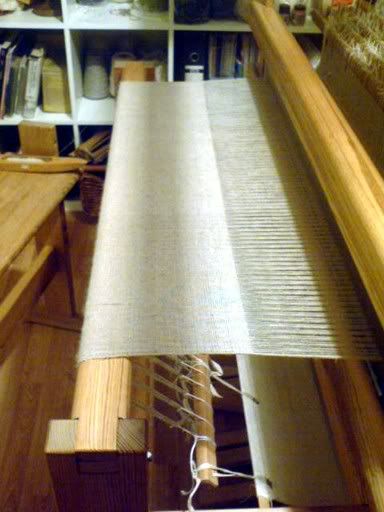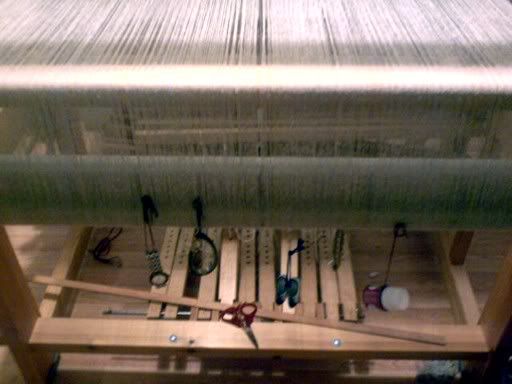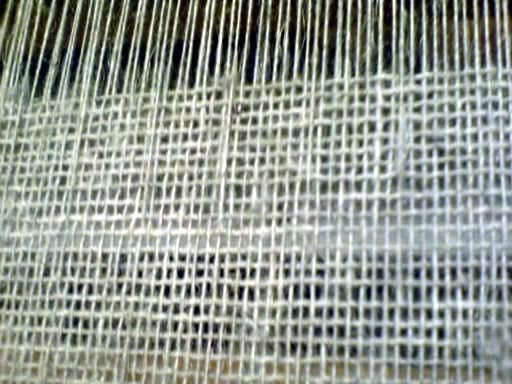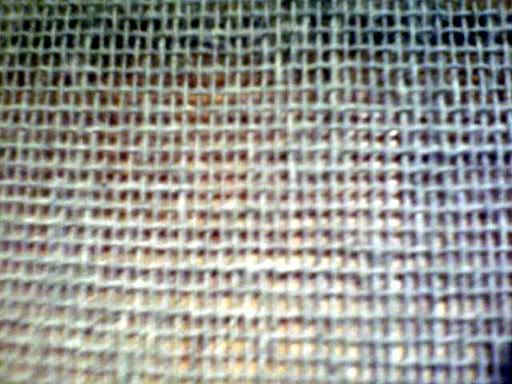
I've woven a bit over 6 inches so far. It's quite a change for me to go from weaving small items with complex weave structures to a large piece of plain yardage. I've not found throwing the shuttle the extra length to be a problem, in terms of width or maintaining an even tension, which is good, as I have a couple of larger project in mind for the future.
Weaving linen for cross-stitch is hardly a complex weave as it's a simple balanced, slightly open plain weave, but it is extremely useful for highlighting any errors that occur in selvedges and weaves. I've had no problem with the selveges, but the weaving itself has been slow going. I've completely gone against the advice I always give novices and I'm not only weaving with a single warp, but I'm weaving with a fluffy one. This makes weaving very slow, as I'm also weaving with a 20-dent reed. every few picks I have to stop and clear slubs of fluff that have formed on the warp, which is very good at developing patience. If I miss one, I risk stretching an individual warp thread which ruins the evenness of the tension across the threads. This has been happening quite a bit despite my care, so the back of my loom is starting to look like an odds and ends store.

Old watches, bracelets, little jars, anything that is the right weight are being employed. I really must try to buy some fisherman's lead weights, I think!
The result of this is that occasionally a thread isn't shedding properly, and a thread will be skipped, resulting in a float.

Rather than try to fix this, I've made the command decision that it will make little difference once it's sewn over anyway, and it will add to the slightly rustic, antique feel of the piece. It's great when you can explain away all errors so easily! I've found that as the warp is stretching so much, it helps to take a leaf from the book of beaming, and go to the back of the loom and tug on the warp thread every so often, to even out the tension. It's been working:

It's not the relaxing weaving I was expecting it to be because of the difficult warp, but I'm pleased that I'm able to surmount those difficulties. I really shouldn't say it because I'm expecting one at any moment, but I've not had a broken warp thread....yet!
Now is really the time that I need to be deciding what to do next, and I'm undecided. I've threaded this current project with a straight threading on all eight shafts, so if I choose the right project I can just tie the next warp on. I could do a few more scarves, or a baby's blanket for some friends who are expecting. Or I may try to take on a couple of experimental samples that have been floating around in my head....I'm thinking of playing with something like Swedish flessbergplegg.
Are those... Barbie's golf shoes?
ReplyDeleteHa! I had to go look to see what you meant!
ReplyDeleteThey're little ceramic clogs, brought as a gift by some friends who live in The Netherlands. They're also the perfect weight for a single stretched warp thread...and I was pulling everything in my possession that was the right weight into service at the time!